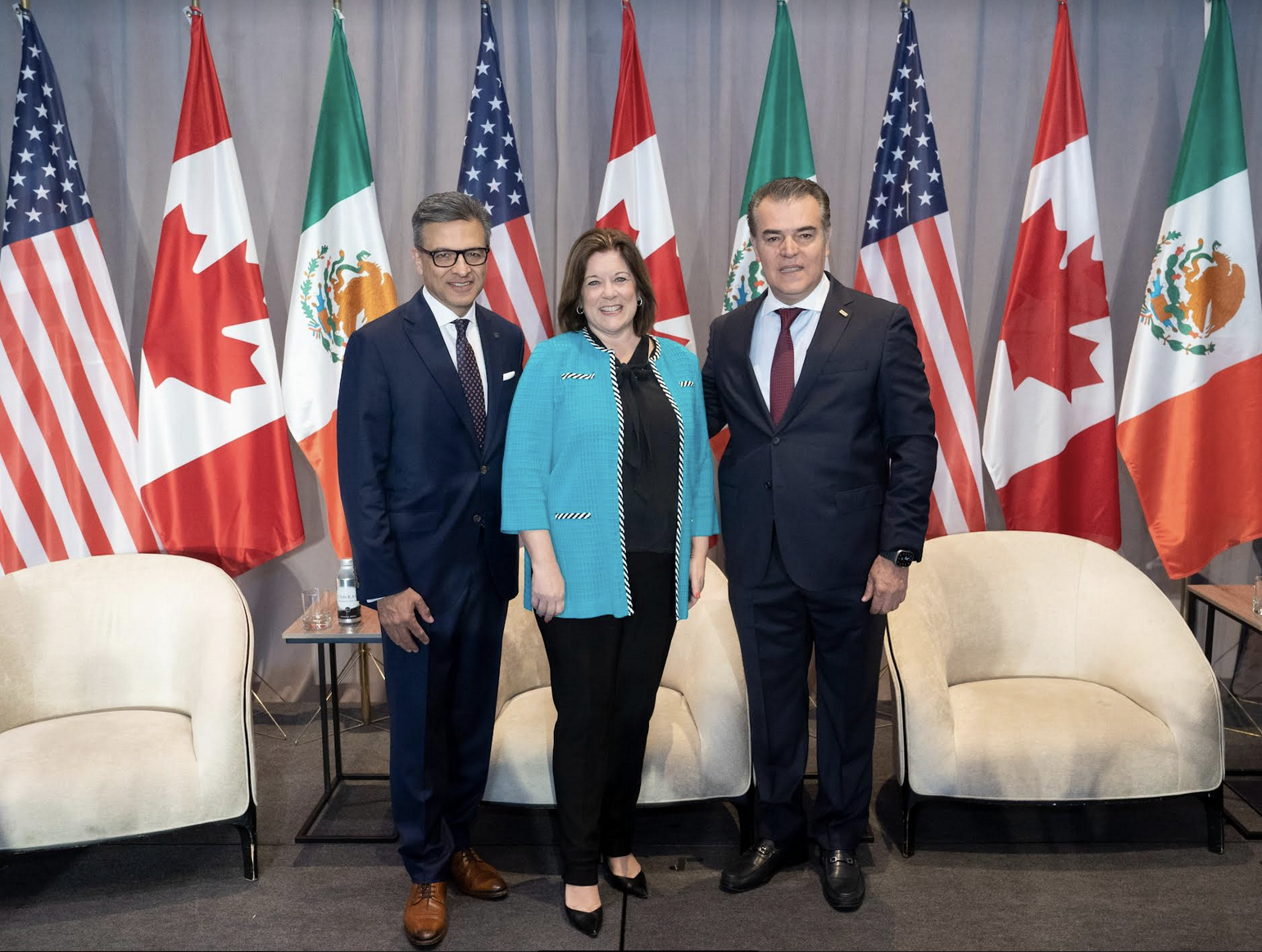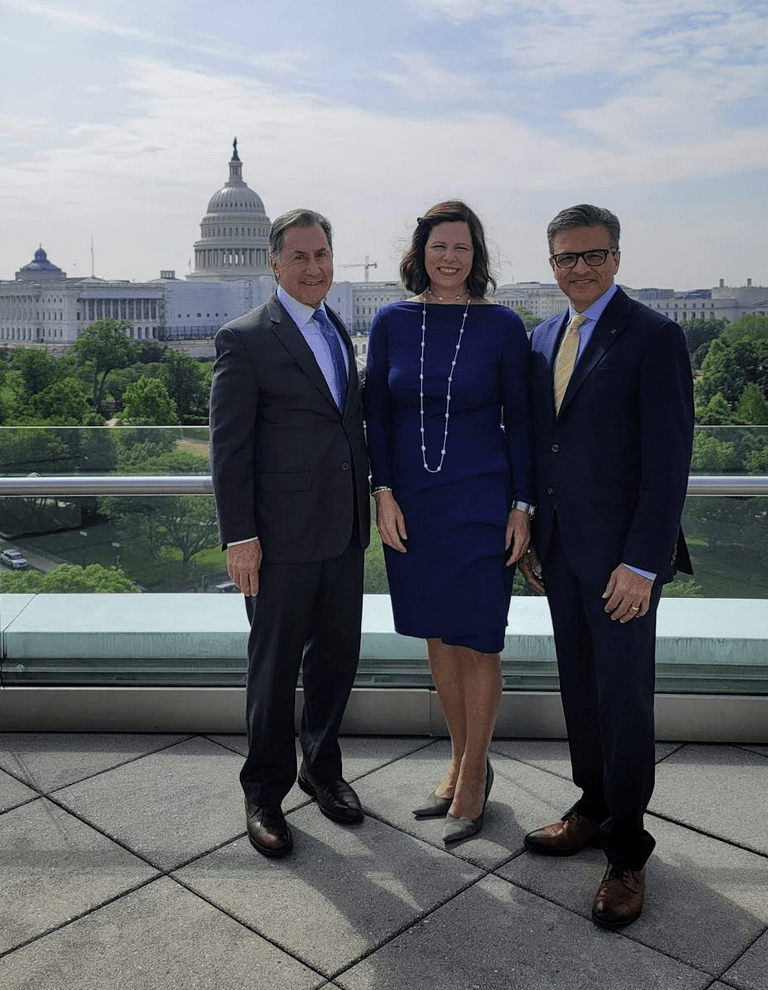A Message From North America’s CEOs: ‘Stronger Together’ is More than a Slogan
 Business Council of Canada President Goldy Hyder, US Chamber of Commerce President Suzanne Clark and El Consejo Coordinador Empresarial President Francisco Cervantes/BCC
Business Council of Canada President Goldy Hyder, US Chamber of Commerce President Suzanne Clark and El Consejo Coordinador Empresarial President Francisco Cervantes/BCC
Louise Blais
May 28, 2023
Four months after the latest North American Leader’s Summit (NALS), or “Three Amigos” heads-of-government meeting was held in Mexico City, CEOs from Canada, the United States and Mexico met in Washington last week to adopt the same Team North America approach to continental competitiveness.
Organized by the Business Council of Canada (BCC) in partnership with the United States Chamber of Commerce (US Chamber), the Consejo Coordinador Empreserial (CCE) and the US-Mexico Foundation (USMF), the one-day event underscored the business community’s effort to forge a trilateral approach to our economic security.
First, a disclosure for the reader; as an advisor to the BCC, I served as co-emcee with Grupo Prodensa CEO Emilio Cadena and also moderated two of the panels. Consequently, this is an insider’s report on why such a large group of business executives and experts gathered in DC, and what came out of the exchange.
The last time representatives of the three business communities came together in common purpose was during the re-negotiation of NAFTA. Four years on, the world has been rocked by several geopolitical crises, from a pandemic to a war in Ukraine and now the fragmentation of global trade. As if these challenges were not enough, they spun off or exacerbated trends in consumer spending, labour shortages and inflation. Senior executives, along with their teams, are on the front lines of these profound changes, making them leaders uniquely positioned as intelligence gatherers, stakeholders and indispensable sources of solutions.
What was on their minds?
First and foremost, a wide agreement that competition should not come from within the region. In North America, we make things together. Case in point, over 75% of Canadian exports to America feed US their manufacturing, making US companies more globally competitive. As growth in many Asian economies continues to outpace our own, it was highlighted repeatedly that all three countries need to leverage our complementarity and further integrate to continue to compete internationally. Ergo the name of conference: Stronger Together.
It’s not just a sentimental slogan.
Today, North America is responsible for a quarter of the world’s GDP; great position to be in and a reason to be optimistic. However, time and time again it was raised by speakers and panelists that we could easily slip, if we do not move more briskly towards a harmonized approach that better harnesses our built-in advantages as a region.
Throughout the meeting, which included nearly all sectors of the economy, one message came through loud and clear: The region is at a crossroads, brought to this point by a series of convergent global shocks, along with the need for bold action to mitigate climate change.
But with the “service engine” dashboard flashing red also comes the opportunity to turn crises into innovation and transformational change. As continental partners, will we seize the day or be left behind?
That question kept coming back, along with areas in need of priority attention by our respective governments. Among them, the need for predictability in regulations and accelerated approvals for major energy, infrastructure and mining investments. As Gary Cohn, the former investment banker and White House advisor, reminded us, there is no shortage of capital. The problem is not the money, it is risk based on the unknowns. Goldy Hyder, CEO of the BCC reiterated, “capital is agnostic” — it will go where it can obtain a return. The fact of the matter is that major projects throughout our region require investors to have blind faith in bureaucratic, opaque and ever-changing permitting processes. That is unsustainable and will simply lead us to lose out to other regions with more favourable, less burdensome offerings.

Congressman Gary Palmer, Louise Blais and Goldy Hyder/BCC
Put another way by François Poirier, CEO of TC Energy, the current regulatory regime deters the very capital that is needed for our energy security and our green transition. Ten years is too long to bring a project into production and will make us miss our window to mitigate climate change and risks creating energy bottlenecks as the grid to support EVs comes online.
Options discussed at the meeting included creating a program that could identify projects of national significance, where all levels of governments and stakeholders would work together to accelerate timelines and bring predictability to the process. Australia has been a pioneer of this model.
Interestingly, these discussions took place in the shadow of the Capitol building where bipartisan consensus is growing on permitting acceleration. Senator Joe Manchin has been pushing his bill Building an American Energy Security Act of 2023. When Goldy Hyder ran into him in the Senate building, the senator appeared rather upbeat about his bill’s prospect, citing support for it on both sides of the aisle.
Should this piece of legislation pass, it would impose a limit of two years on environmental reviews of major federal energy projects and one year for smaller ones, reduce court delays over energy projects and direct the president to designate at least 25 high-level energy projects and prioritize their permitting.
Where will that leave Canada, where permitting is onerous, lengthy and unpredictable? Just as with the Inflation Reduction Act, our country would find itself at best playing catch-up and, at worst, at a marked disadvantage.
The message we brought back from Washington is that we need to act with more urgency. The critical minerals needed for batteries, of which Canada has plentiful deposits, are in the ground and some, far from market without existing infrastructure. While we should not have waited for the Americans to show us the way, it is now essential that we align our policies if we want to build and compete with our battery supply chains.
In fact, that is the key takeaway: We must find a way to work together to develop optimal industrial policy that is well-informed and mindful of the damage that primarily nationalistic measures can cause to our competitiveness. After all, as the President of the U.S. Chambers, Suzanne Clark said: “Protectionism drives up cost.”
Another topic that ran through the discussions was the renewal of CUSMA, or the “New NAFTA”coming up in 2026. A smooth roll-over of the agreement is seen as crucial because it serves as the basis for our continental trading platform. The pact creates stability at a time when the world is full of shocks.
However, with the 2024 US election looming and Washington already in campaign mode, our Canadian business delegation also used its time in DC to gage support for the agreement in Congress. There, we still have work to do to ensure that the success of the agreement is well understood, and that the renewal does not get caught up in partisan electoral politics.
The Chairman of the BCC and CEO of CIBC, Victor Dodig, summed up the message for Americans this way: “From the financial sector and manufacturing, to energy and agriculture, the Canadian business sector, represented by a wide range of companies, supports hundreds of thousands of jobs on both sides of the border and benefit thousands of communities.”
Other themes that were addressed included cybersecurity with Jen Easterly, director of the U.S. Cybersecurity and Infrastructure Security Agency, and the workforce of the future, a panel that included Brooks Tingle, CEO of John Hancock, and Procter & Gamble Canada President Geraldine Huse.
With so much uncertainty in the world, the case for a stable and integrated North American economy has never been stronger. The business community gets it and has made it a priority. Working with its partners, it is united and will continue to engage collaboratively with all three governments on every occasion and at key moments, including when Canada hosts the next “Three Amigos” summit in December.
Policy contributing writer Louise Blais served as Canada’s ambassador to the United Nations and as consul general in Atlanta. She is now an advisor to the Business Council of Canada and diplomat in residence at l’Université Laval.
